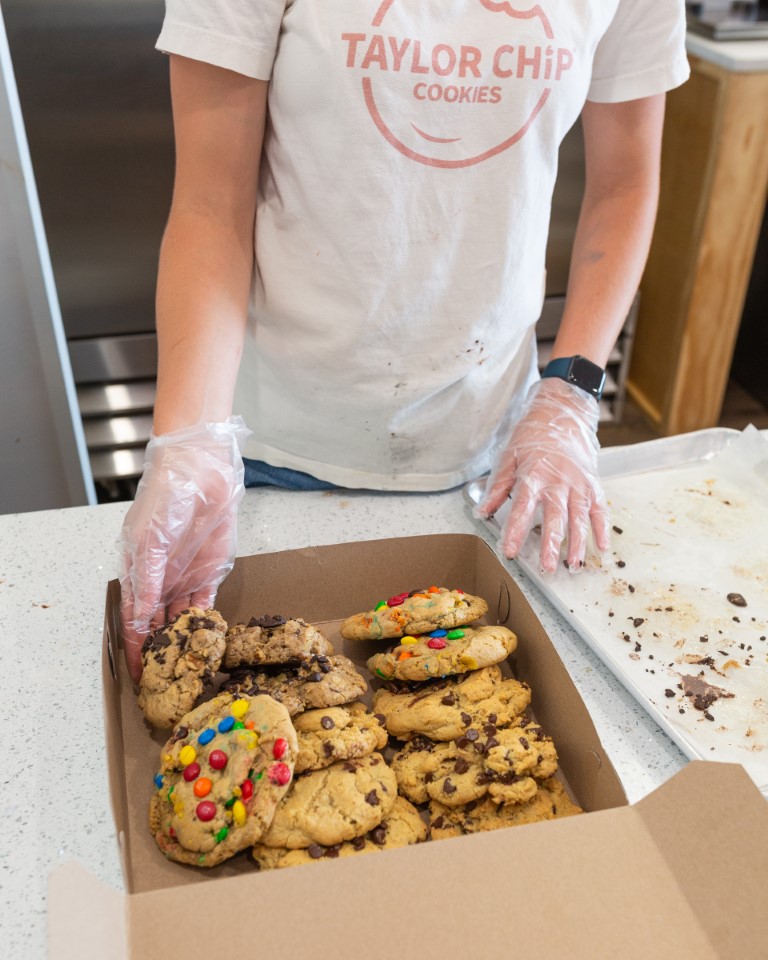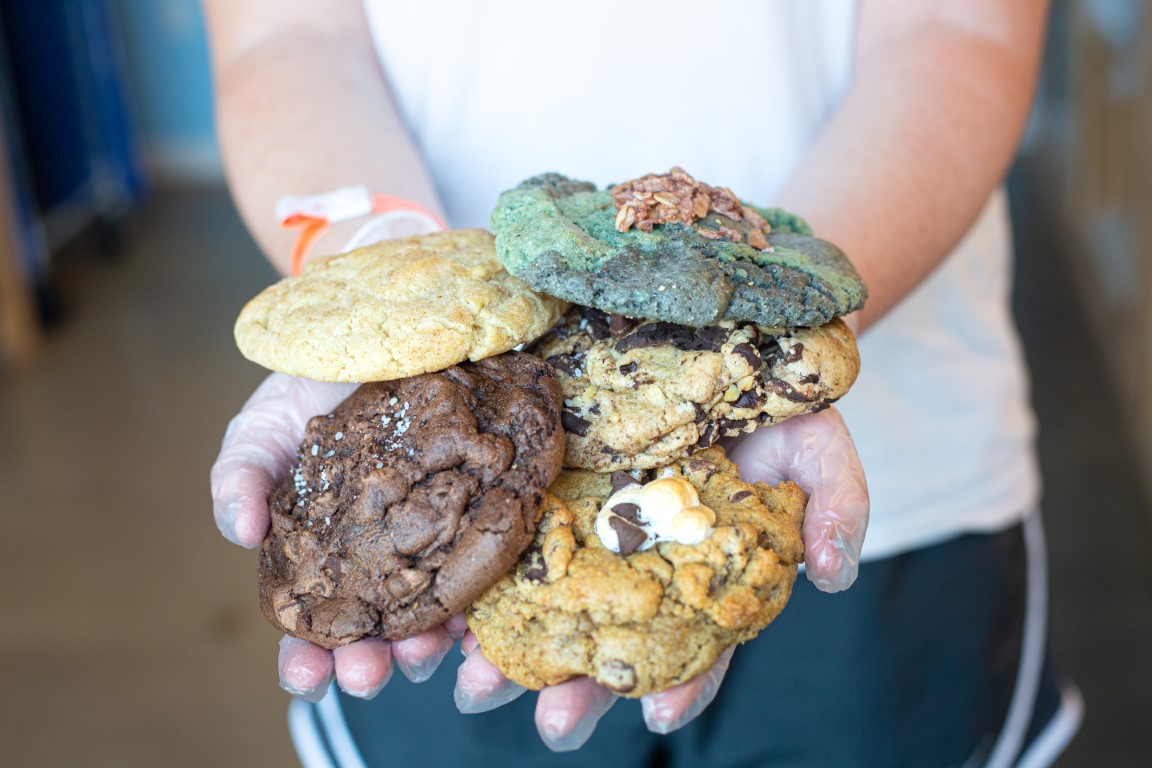Yes, cookies do go bad, and factors like moisture content, ingredient perishability, and improper storage can all contribute. Soft cookies tend to spoil more quickly due to higher moisture levels, whereas hard cookies last longer due to their low moisture content. Signs of spoilage include mold, discoloration, undesirable odors, and notable changes in texture. Proper storage in airtight containers, away from heat and humidity, can help extend their shelf life. Although refrigerated or frozen cookies last longer, be cautious as storing them improperly can alter their texture. As you explore further, you'll reveal more about cookie preservation.
Key Takeaways
- Cookies can go bad due to mold, discoloration, or off smells indicating spoilage.
- Soft cookies spoil faster than crisp ones due to higher moisture content.
- Proper storage in airtight containers extends cookie freshness and prevents staleness.
- Expired cookies may harbor harmful bacteria, posing health risks if consumed.
- Regular smell and visual checks help determine cookie freshness and safety.
Understanding Cookies
When you're exploring the realm of cookies, you'll come across various types, each with unique characteristics and flavors. Understanding the common ingredients like flour, sugar, butter, and eggs is essential, as they play specific roles in texture, taste, and shelf life. By knowing how these ingredients interact, you can better grasp why cookies might go bad over time and how to store them properly.
Types of Cookies
Dive into the delightful world of cookies, and you'll find an impressive variety that caters to every taste bud. Whether you're a fan of classic chocolate chip cookies or enjoy experimenting with different flavors, there's a type of cookie for everyone. Homemade cookies offer that personal touch, allowing you to customize ingredients and textures to your liking. Understanding the types of cookies available can help you decide which ones to bake or buy.
Here's a quick overview of the main types:
-
Crisp Cookies: These cookies are known for their firm texture and satisfying crunch. They often contain less moisture, which helps them maintain their crispness over time.
-
Chewy Cookies: If you prefer a softer bite, chewy cookies are your go-to. They typically have a higher moisture content, which keeps them tender and delectable.
-
Chocolate Chip Cookies: These are perhaps the most iconic type, featuring a perfect balance of sweetness and chocolatey goodness.
Each type has its own unique qualities and appeal, making them suitable for different occasions and preferences. Whether you're baking for a party or just a cozy night in, knowing these basic types of cookies will guide you in making delicious choices.

Choose Your Own Delightfully Perfect Cookies.
With almost 30 flavors to choose from, you can make your box as unique as you are.
Common Ingredients and Their Role
Baking cookies is all about how you bring together common ingredients that each play an essential role in the final product. Every ingredient in a cookie recipe has a purpose, contributing to taste, texture, or structure. When making butter-based cookies, for instance, butter offers richness and a tender crumb. It also helps in spreading the cookies during baking. Brown sugar, another key ingredient, not only provides sweetness but also adds moisture, making cookies chewy and flavorful. Its molasses content can deepen the flavor profile, especially in chocolate chip cookies, where it complements the chocolate's richness.
Flour, often taken for granted, provides the structure. It interacts with other ingredients, like eggs, which act as binders and add moisture. Eggs are perishable ingredients, so their freshness is essential for both safety and the best cookie texture. Leavening agents such as baking soda or baking powder are also common ingredients, responsible for making cookies rise and become light. Chocolate chips, though not perishable, can lose quality over time. It's critical to store them properly. Understanding how these ingredients work together helps you make cookies that are both delicious and structurally sound, ensuring your treats don't go bad too soon.
Factors Influencing Cookie Shelf Life
When considering how long cookies last, you need to think about factors like moisture content and storage conditions, as they play a vital role in determining shelf life. Soft cookies, due to their higher moisture content, tend to spoil faster than their hard counterparts, which are generally more resilient to changes in their environment. Proper storage in airtight containers, away from humidity and heat, can greatly extend the freshness of both types, ensuring your treats remain enjoyable.
Moisture Content and Storage Conditions
The moisture content in cookies plays an important role in determining their shelf life, as it directly affects their texture and freshness. When cookies have high moisture content, they tend to become stale more quickly. To maintain their quality, you should consider how you store them. Using an airtight container is vital, as it prevents external moisture from seeping in and keeps the cookies from drying out. Conversely, improper storage can accelerate spoilage, making cookies lose their desired texture and taste.
To prolong the shelf life of your cookies, follow these storage tips:
- Store cookies in air-tight containers to maintain their texture and flavor.
- Keep cookies away from direct sunlight and heat sources to avoid altering their moisture content.
- Avoid storing cookies with strong-smelling foods, as they can absorb odors.
It's important to remember that different types of cookies may require slightly different storage methods, so always consider the specific needs of the cookies you're storing. Proper storage conditions not only keep cookies fresh but also guarantee they taste as delicious as when they were first baked. By managing moisture content and storage conditions, you can enjoy your cookies for a longer time.
Differences Between Soft and Hard Cookies
Between soft and hard cookies, several factors influence their shelf life, making it vital to understand these differences for ideal storage. The texture of a cookie plays a notable role in how long it stays fresh. Soft cookies, due to their higher moisture content, tend to become stale quicker than crispy cookies. This moisture can evaporate over time, leading to a change in texture and taste. To maintain their softness, you should store them in an airtight plastic container, which helps retain their moisture and prolongs freshness.
In contrast, crispy cookies are made to be dry and crunchy, which naturally extends their shelf life. They benefit from a different storage method, ideally in a container that allows for minimal air circulation to prevent them from becoming soggy. While an airtight plastic container can still be used, it's essential to guarantee the environment remains dry.
Understanding these differences in texture and storage needs can help you choose the right method for each type of cookie, ensuring they remain enjoyable for as long as possible. By considering these factors, you can maximize the shelf life of both soft and crispy cookies effectively.
Signs of Spoiled Cookies
When you're trying to determine if cookies have gone bad, pay close attention to visual and textural indicators, such as mold or an unusually hard or crumbly texture, which often signal spoilage. Additionally, performing a smell test can be quite revealing; any off or sour odors usually mean the cookies are no longer safe to eat. By keeping an eye, and nose, on these factors, you can better assess the freshness of your cookies and guarantee they're still enjoyable.
Visual and Textural Indicators
One of the easiest ways to identify spoiled cookies is by examining their appearance and texture. When cookies lose their freshness, they often become stale, a clear sign of spoilage. Stale cookies might have a dry or hard surface, indicating that time has been the enemy of cookie freshness. You'll notice a change in texture as well. Fresh cookies typically have a soft texture, but spoiled ones can become either too soft or too crumbly.
Here are some visual and textural indicators to watch for:
- Soft Texture: If cookies feel excessively soft or sticky, it might suggest they've absorbed too much moisture over time.
- Crumbly Texture: A crumbly texture can indicate that the cookies have dried out and lost their initial freshness.
- Discoloration or Mold: Look for any unusual spots or color changes, as these are definite signs of spoilage.
The Smell Test
While visual and textural cues offer important understandings into cookie spoilage, your sense of smell can be just as revealing. Conducting a smell test is a simple yet effective method to determine cookie freshness. Fresh cookies typically emit a delightful aroma, often reminiscent of vanilla, chocolate, or butter, depending on their ingredients. This inviting scent is a sign of well-preserved baked cookies.
In contrast, bad cookies often have an off-putting smell. If you notice a sour, musty, or rancid odor, it's a clear indication that the cookies have gone stale or spoiled. The presence of these unpleasant smells usually suggests that the oils or fats within the cookies have oxidized or that they've absorbed unwanted odors from their environment. This is a common issue when cookies are stored improperly or exposed to air for prolonged periods.
Performing a smell test is straightforward. Simply hold the cookie close to your nose and inhale gently. If the scent seems off or different from the usual aroma of fresh cookies, it's best to err on the side of caution and discard them. Maintaining cookie freshness is essential, and the smell test is an essential tool in ensuring your treats remain enjoyable.
Proper Cookie Storage Techniques
When storing cookies, consider whether to keep them at room temperature, refrigerate, or freeze them, as each option affects their freshness differently. Room temperature storage is suitable for short-term use, but refrigeration or freezing can extend their shelf life considerably, especially if you want to preserve their taste and texture for a longer period. To maintain cookie quality, use airtight containers or resealable bags, as these packaging methods help prevent moisture and air exposure, which can lead to staleness.
Room Temperature vs. Refrigeration vs. Freezing
Storing cookies properly can make all the difference in maintaining their freshness and flavor. When deciding between room temperature, refrigeration, or freezing, it's important to understand how each method affects the cookies. Keeping cookies fresh at room temperature works well for short-term storage, especially for soft or chewy varieties. Place them in an airtight container to prevent them from drying out or absorbing odors.
Refrigeration can extend the cookies' shelf life, but it may also alter their texture. The cold air can make cookies harder, so it's best for certain types, like crispy cookies. To combat this, allow them to return to room temperature before consuming.
Freezing is ideal for long-term storage, helping to preserve freshness and flavor. However, improper freezing can lead to freezer burn, which can ruin the taste. To avoid this, make certain cookies are tightly wrapped before placing them in the freezer.
- Room Temperature: Best for short-term storage, maintains texture.
- Refrigeration: Extends shelf life, can harden cookies.
- Freezing: Preserves freshness long-term, watch out for freezer burn.
Choosing the right method depends on how soon you plan to eat your cookies.
Packaging Methods for Longevity
To keep your cookies fresh for as long as possible, focus on using effective packaging methods. Start by wrapping each cookie individually in plastic wrap to prevent them from sticking together. This step is particularly important if you plan to store different types of cookies in the same container. After wrapping, place the cookies in a zip-top bag, which provides an airtight seal to prevent moisture and air from entering, both of which can make cookies go stale more quickly.
For additional protection, consider placing the zip-top bags inside sturdy storage containers. These containers offer an added layer of defense against humidity and accidental crushing, especially if you're storing cookies for an extended period. If you don't have plastic wrap on hand, you can also use wax paper to separate layers of cookies within the container, ensuring they maintain their texture and flavor.
For those who prefer a more eco-friendly approach, aluminum foil also works well. Wrap the cookies in foil and then place them in a container or bag. This method helps in retaining moisture and preventing the cookies from becoming too dry. By utilizing these techniques, you can enjoy delicious cookies for weeks.
Shelf Life of Different Cookie Types
When considering how long cookies will last, it's important to identify that different types of cookies have varying shelf lives. Soft cookies, due to their higher moisture content, tend to spoil faster than hard cookies, which can stay fresh for weeks if stored properly. Filled cookies, containing perishable fillings like cream or jam, often have the shortest shelf life and require refrigeration to maintain their quality.
Soft, Hard, and Filled Cookies
Cookies' diverse textures and fillings play a vital role in determining their shelf life. Soft cookies, with their delightfully moist texture, are prone to going limp if not stored properly. They benefit from being kept in airtight containers to maintain their freshness. However, refrigeration can lead to spoilage by drying them out or altering their flavor, so it's best to store them at room temperature when possible.
Filled cookies, on the other hand, have unique considerations due to their creamy or fruity fillings. These cookies might require refrigeration to prevent the fillings from spoiling, especially if they contain perishable ingredients like cream cheese or fresh fruit. Here are some general storage tips for different types of cookies:
- Soft cookies: Keep them in airtight containers to preserve moisture and texture.
- Filled cookies: Consider refrigeration if fillings are perishable, but be cautious of texture changes.
- Hard cookies: Store in dry conditions to maintain their crispness.
Hard cookies usually have a longer shelf life because they lack the moisture that leads to spoilage. Maintaining a dry environment is key to preventing them from becoming stale. By understanding the needs of each type, you can extend the shelf life of your cookies effectively.
Health Implications of Expired Cookies
When cookies pass their prime, you're faced with potential risks that may affect your health, as expired cookies can harbor mold or harmful bacteria. It's vital to assess the safety of these treats, as consuming them might lead to foodborne illnesses or digestive discomfort. If you find your cookies have gone bad, consider proper disposal methods or think about creative ways to reuse them in non-food applications, ensuring your safety and minimizing waste.
Potential Risks and Food Safety Concerns
Eating expired cookies might not always seem risky, but there are potential health concerns you should be aware of. When cookies are made with fresh high-quality ingredients, they generally have a shorter shelf life. This is because these ingredients can spoil over time, leading to potential food safety issues. Proper food-safety storage-lifetime cookies practices are critical to prolong the life of cookies and prevent any health risks.
A container with cookies can help extend their freshness, but once they pass their prime, you may encounter:
- Mold Growth: Stale cookies can develop mold, which can be harmful if ingested.
- Off Flavors: Expired cookies might taste unpleasant due to rancid fats or oils.
- Texture Changes: They can become overly hard or soft, indicating they're past their best.
To avoid these risks, always check the condition of your cookies before consumption. If you notice any unusual smells, colors, or textures, it's best to discard them. Keeping cookies in airtight containers in a cool, dry place will help maintain their quality and safety. Be mindful of the expiration dates to guarantee you're enjoying your treats at their best.
Proper Disposal and Creative Reuse Ideas
Many times, expired cookies might seem destined for the trash, but there are creative ways to dispose of them responsibly. Instead of letting old batches of cookies disappear into the landfill, consider using them to enrich your garden. Crumble the cookies and mix them into your compost pile; they break down and add nutrients to the soil. Just be certain to use cookies without harmful ingredients like chocolate, which can be detrimental to pets and wildlife.
If your cookies have simply lost their fresh taste but are still safe, try repurposing them in the kitchen. Use them as a base for a pie crust or mix them into a batch of new cookies, allowing the flavor transfer to create interesting combinations. As cookies age, their distinct tastes often blend, so separate flavors before mixing to guarantee a balanced result.
You can also crush them and use as a topping for ice cream or yogurt, adding texture and sweetness. By exploring these options, you not only reduce waste but also find creative uses for expired cookies, making certain that every crumb counts before considering disposal.
Enjoying Cookies Safely
To enjoy cookies safely, you should pay attention to how they're stored, as proper storage can greatly extend their freshness and prevent spoilage. Use airtight containers to keep them crisp, and consider refrigerating or freezing them if you don't plan to eat them soon. Additionally, be mindful of portion sizes and ingredients, especially if you have dietary restrictions, to make the most of your cookie experience without compromising your health.
Key Points on Longevity and Storage
When it comes to enjoying cookies safely, understanding their longevity and proper storage is essential. Proper storage can extend their shelf life and maintain their quality. Storing cookies in the freezer is an excellent way to keep them fresh for several months. Use air-tight freezer containers to prevent freezer burn and moisture infiltration. By doing this, you guarantee the cookies retain their original texture and flavor.
If you're baking, consider making the dough in advance. Homemade cookie dough can be stored in the freezer, allowing you to bake fresh cookies whenever you want. Just make sure to wrap the dough tightly in plastic and place it in an air-tight container to prevent it from absorbing freezer odors.
Here are some key points to remember:
- Use a sturdy container of cookies to avoid breaking and crumbling.
- Ensure all containers are thoroughly sealed to keep out air and moisture.
- Consider portioning out dough into smaller balls for easy baking later.
Mindful Consumption Tips
Savoring cookies safely means being mindful of both quantity and quality. To enjoy cookies without overindulgence, consider these mindful consumption tips: start by setting aside a specific portion to savor, preventing the temptation of mindless munching. When selecting cookies to gift, verify they're fresh by checking the duration of freshness; ideally, choose cookies that maintain their quality for at least a week. It's also a good idea to arrange cookies by flavor on a dessert display tray, allowing guests to select their favorites without overwhelming themselves with too many options.
To further enhance your cookie experience, focus on the quality of each bite. Take the time to appreciate the texture and flavor of the cookies you choose. This approach not only makes each cookie more enjoyable but also prevents you from eating more than necessary. If you're storing extras, remember that the duration of freshness varies by type, so check storage guidelines for each variety. Finally, when gifting cookies, opt for airtight packaging to preserve their freshness, verifying your recipients enjoy them at their best. By following these mindful consumption tips, you can safely indulge in cookies while maintaining their quality and freshness.
Our Journey to Cookie Perfection: Why Trust Our Baking Insights
At Taylor Chip, our expertise in cookie baking isn't just a profession—it's a passion that blossomed alongside our relationship. Since 2015, Sara and Dougie Taylor have dedicated themselves to mastering the art of cookie creation, turning date nights into delicious experiments and transforming their shared love for sweets into a craft.
Our journey to cookie perfection wasn't overnight. It took years of hands-on experience, countless batches, and a relentless pursuit of the ideal cookie. This dedication led us to refine our recipes, understand the intricate balance of ingredients, and master the nuances of baking techniques. By the time we tied the knot, we had also achieved another milestone: the perfect cookie. This expertise now informs every aspect of our baking process and the advice we share. When we discuss topics like cookie shelf life, ingredient roles, or storage techniques, we're not just relaying information—we're sharing insights gained from years of practical experience.
Our deep understanding of how different ingredients interact, how moisture affects texture, and how storage conditions impact freshness comes from our journey of trial, error, and ultimate success. Trust in our baking insights, because every piece of advice is backed by our passion, persistence, and proven results in creating the perfect cookie.
Frequently Asked Questions
Can Homemade Cookies Last Longer Than Store-Bought Ones?
Homemade cookies can last longer if you store them properly. While store-bought cookies often contain preservatives, homemade ones rely on airtight containers and cool, dry places to maintain freshness. Always check for signs of staleness.
Do Gluten-Free Cookies Spoil Faster Than Regular Cookies?
You may notice gluten-free cookies spoil faster than regular ones due to their lack of preservatives and different ingredients. Store them properly, perhaps in an airtight container, to help extend their freshness and enjoy them longer.
Is It Safe to Eat Cookies Past Their Expiration Date?
You can eat cookies past their expiration date, but check for signs of spoilage like mold, off smells, or unusual textures. If they look and smell fine, they're typically safe, but their taste might diminish.
How Do Preservatives in Cookies Affect Their Shelf Life?
Preservatives in cookies extend their shelf life by slowing down spoilage. You'll notice cookies last longer without losing flavor or texture. When choosing cookies, consider ones with preservatives for longer storage without sacrificing quality.
Can Freezing Cookies Extend Their Freshness Indefinitely?
You might think freezing cookies keeps them fresh forever, but it doesn't. Freezing slows down spoilage by halting bacterial growth and moisture loss, but flavors and textures can still degrade over time. Eat them within a few months.
Conclusion
To guarantee your cookies remain fresh and safe to eat, it's crucial to understand how factors like moisture, temperature, and exposure to air influence their shelf life. Acknowledge signs of spoilage, such as off smells or changes in texture, and store cookies properly in airtight containers. Different types of cookies have varying shelf lives, so be attentive to these differences. Consuming expired cookies can pose health risks, so always prioritize freshness and proper storage techniques to enjoy them safely.










